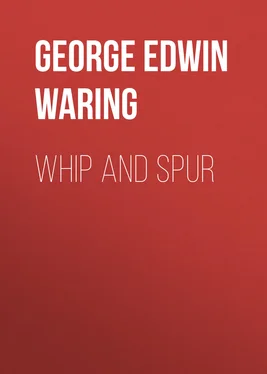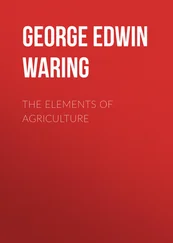George Edwin Waring - Whip and Spur
Здесь есть возможность читать онлайн «George Edwin Waring - Whip and Spur» — ознакомительный отрывок электронной книги совершенно бесплатно, а после прочтения отрывка купить полную версию. В некоторых случаях можно слушать аудио, скачать через торрент в формате fb2 и присутствует краткое содержание. Жанр: Биографии и Мемуары, История, foreign_edu, foreign_antique, foreign_prose, на английском языке. Описание произведения, (предисловие) а так же отзывы посетителей доступны на портале библиотеки ЛибКат.
- Название:Whip and Spur
- Автор:
- Жанр:
- Год:неизвестен
- ISBN:нет данных
- Рейтинг книги:4 / 5. Голосов: 1
-
Избранное:Добавить в избранное
- Отзывы:
-
Ваша оценка:
- 80
- 1
- 2
- 3
- 4
- 5
Whip and Spur: краткое содержание, описание и аннотация
Предлагаем к чтению аннотацию, описание, краткое содержание или предисловие (зависит от того, что написал сам автор книги «Whip and Spur»). Если вы не нашли необходимую информацию о книге — напишите в комментариях, мы постараемся отыскать её.
Whip and Spur — читать онлайн ознакомительный отрывок
Ниже представлен текст книги, разбитый по страницам. Система сохранения места последней прочитанной страницы, позволяет с удобством читать онлайн бесплатно книгу «Whip and Spur», без необходимости каждый раз заново искать на чём Вы остановились. Поставьте закладку, и сможете в любой момент перейти на страницу, на которой закончили чтение.
Интервал:
Закладка:
George E. Waring
Whip and Spur
VIX
When the work on the Central Park had fairly commenced, in the spring of 1858, I found—or I fancied—that proper attention to my scattered duties made it necessary that I should have a saddle-horse.
How easily, by the way, the arguments that convince us of these pleasant necessities find their way to the understanding!
Yet, how to subsist a horse after buying one, and how to buy? The memory of a well-bred and keen-eyed gray, dating back to the earliest days of my boyhood, and forming the chief feature of my recollection of play-time for years; an idle propensity, not a whit dulled yet, to linger over Leech’s long-necked hunters, and Herring’s field scenes; an almost superstitious faith in the different analyses of the bones of the racer and of the cart-horse; a firm belief in Frank Forester’s teachings of the value of “blood,”—all these conspired to narrow my range of selection, and, unfortunately, to confine it to a very expensive class of horses.
Unfortunately, again, the commissioners of the Park had extremely inconvenient ideas of economy, and evidently did not consider, in fixing their schedule of salaries, how much more satisfactory our positions would have been with more generous emolument.
How a man with only a Park salary, and with a family to support, could set up a saddle-horse,—and not ride to the dogs,—was a question that exercised not a little of my engineering talent for weeks; and many an odd corner of plans and estimates was figured over with calculations of the cost of forage and shoeing.
Stable-room was plenty and free in the condemned buildings of the former occupants, and a little “over-time” of one of the men would suffice for the grooming.
I finally concluded that, by giving up cigars, and devoting my energies to the pipe in their stead, I could save enough to pay for my horse’s keep; and so, the ways and means having been, in this somewhat vague manner, provided, the next step was to buy a horse. To tell of the days passed at auction sales in the hope (never there realized) of finding goodness and cheapness combined,—of the stationery wasted in answering advertisements based on every conceivable form of false pretence; to describe the numberless broken-kneed, broken-winded, and broken-down brutes that came under inspection,—would be tedious and disheartening.
Good horses there were, of course, though very few good saddle-horses (America is not productive in this direction),—and the possible animals were held at impossible prices.
Those who rode over the new Park lands usually rode anything but good saddle-horses. Fast trotters, stout ponies, tolerable carriage-horses, capital cart-horses, there were in plenty. But the clean-cut, thin-crested, bright-eyed, fine-eared, steel-limbed saddle-horse, the saddle-horse par excellence ,—may I say the only saddle-horse?—rarely came under observation; and when, by exception, such a one did appear, he was usually so ridden that his light was sadly dimmed. It was hard to recognize an elastic step under such an unelastic seat.
Finally, in the days of my despair, a kind saddler,—kept to his daily awl by a too keen eye for sport, and still, I believe, a victim to his propensity for laying his money on the horse that ought to win but don’t,—hearing of my ambition (to him the most laudable of all ambitions), came to put me on the long-sought path.
He knew a mare, or he had known one, that would exactly suit me. She was in a bad way now, and a good deal run down, but he always thought she “had it in her,” and that some gentleman ought to keep her for the saddle,—“which, in my mind, sir, she be the finest bit of ’orse-flesh that was hever imported, sir.” That was enough. “Imported” decided my case, and I listened eagerly to the enthusiastic story,—a story to which this man’s life was bound with threads of hard-earned silver, and not less by a real honest love for a fine animal. He had never been much given to saving, but he was a good workman, and the little he had saved had been blown away in the dust that clouded his favorite at the tail of the race.
Still, he attached himself to her person, and followed her in her disgrace. “She weren’t quite quick enough for the turf, sir, but she be a good ’un for a gentleman’s ’ack.”
He had watched her for years, and scraped acquaintance with her different owners as fast as she had changed them, and finally, when she was far gone with pneumonia, he had accepted her as a gift, and, by careful nursing, had cured her. Then, for a time, he rode her himself, and his eye brightened as he told of her leaps and her stride. Of course he rode her to the races, and—one luckless day—when he had lost everything, and his passion had got the better of his prudence, he staked the mare herself on a perfectly sure thing in two-mile-heats. Like most of the sure things of life, this venture went to the bad, and the mare was lost,—lost to a Bull’s Head dealer in single driving horses. “I see her in his stable ahfter that, sir; and, forbieten she were twelve year old, sir, and ’ad ’ad a ’ard life of it, she were the youngest and likeliest of the lot,—you’d swore she were a three-year-old, sir.”
If that dealer had had a soul above trotting-wagons, my story would never have been written; but all was fish that came to his net, and this thoroughbred racer, this beautiful creature who had never worn harness in her life, must be shown to a purchaser who was seeking something to drive. She was always quick to decide, and her actions followed close on the heels of her thought. She did not complicate matters by waiting for the gentleman to get into the wagon, but then and there—on the instant—kicked it to kindlings. This ended the story. She had been shown at a high figure, and was subsequently sold for a song,—he could tell me no more. She had passed to the lower sphere of equine life and usefulness,—he had heard of a fish-wagon, but he knew nothing about it. What he did know was, that the dealer was a dreadful jockey, and that it would never do to ask him. Now, here was something to live for,—a sort of princess in disgrace, whom it would be an honor to rescue, and my horse-hunting acquired a new interest.
By easy stages, I cultivated the friendship of the youth who, in those days, did the morning’s sweeping-out at the Bull’s Head Hotel. He had grown up in the alluring shades of the horse-market, and his daily communion from childhood had been with that “noble animal.” To him horses were the individuals of the world,—men their necessary attendants, and of only attendant importance. Of course he knew of this black she-devil; and he thought that “a hoss that could trot like she could on the halter” must be crazy not to go in harness.
However, he thought she had got her deserts now, for he had seen her, only a few weeks before, “a draggin’ clams for a feller in the Tenth Avener.” Here was a clew at last,—clams and the Tenth Avenue. For several days the scent grew cold. The people of the Licensed Vender part of this street seemed to have little interest in their neighbors’ horses; but I found one man, an Irish grocer, who had been bred a stable-boy to the Marquis of Waterford, and who did know of a “poor old screw of a black mare” that had a good head, and might be the one I was looking for; but, if she was, he thought I might as well give it up, for she was all broken down, and would never be good for anything again.
Taking the address, I went to a stable-yard, in what was then the very edge of the town, and here I found a knowing young man, who devoted his time to peddling clams and potatoes between New York and Sing Sing. Clams up, and potatoes down,—twice every week,—distance thirty miles; road hilly; and that was the wagon he did it with,—a heavy wagon with a heavy arched top, and room for a heavy load, and only shafts for a single horse. In reply to my question, he said he changed horses pretty often, because the work broke them down; but he had a mare now that had been at it for three months, and he thought she would last some time longer. “She’s pretty thin, but you ought to see her trot with that wagon.” With an air of idle curiosity, I asked to see her,—I had gone shabbily dressed, not to excite suspicion; for men of the class I had to treat with are usually sharp horse-traders,—and this fellow, clam-pedler though he was, showed an enthusiastic alacrity in taking me to her stall. She had won even his dull heart, and he spoke of her gently, as he made the most of her good points, and glossed over her wretched condition.
Читать дальшеИнтервал:
Закладка:
Похожие книги на «Whip and Spur»
Представляем Вашему вниманию похожие книги на «Whip and Spur» списком для выбора. Мы отобрали схожую по названию и смыслу литературу в надежде предоставить читателям больше вариантов отыскать новые, интересные, ещё непрочитанные произведения.
Обсуждение, отзывы о книге «Whip and Spur» и просто собственные мнения читателей. Оставьте ваши комментарии, напишите, что Вы думаете о произведении, его смысле или главных героях. Укажите что конкретно понравилось, а что нет, и почему Вы так считаете.












